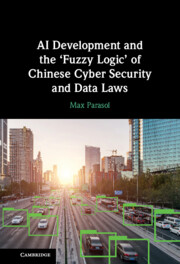Book contents
- AI Development and the ‘Fuzzy Logic’ of Chinese Cyber Security and Data Laws
- AI Development and the ‘Fuzzy Logic’ of Chinese Cyber Security and Data Laws
- Copyright page
- Contents
- Detailed Contents
- Acknowledgements
- Abbreviations
- Introduction
- Part I Historical and Doctrinal Background
- Part II Impact on Artificial Intelligence
- 6 The Impacts of Data Localisation on Globalised Ecosystems and Chinese Tech
- 7 Data Protection but Not Data Privacy
- 8 The Current State of AI Research Is Perfectly Suited to China’s Fuzzy Logic System
- 9 Open-Source AI Platforms and the Cyber Security Law
- Conclusion
- Bibliography
- Index
8 - The Current State of AI Research Is Perfectly Suited to China’s Fuzzy Logic System
from Part II - Impact on Artificial Intelligence
Published online by Cambridge University Press: 16 December 2021
- AI Development and the ‘Fuzzy Logic’ of Chinese Cyber Security and Data Laws
- AI Development and the ‘Fuzzy Logic’ of Chinese Cyber Security and Data Laws
- Copyright page
- Contents
- Detailed Contents
- Acknowledgements
- Abbreviations
- Introduction
- Part I Historical and Doctrinal Background
- Part II Impact on Artificial Intelligence
- 6 The Impacts of Data Localisation on Globalised Ecosystems and Chinese Tech
- 7 Data Protection but Not Data Privacy
- 8 The Current State of AI Research Is Perfectly Suited to China’s Fuzzy Logic System
- 9 Open-Source AI Platforms and the Cyber Security Law
- Conclusion
- Bibliography
- Index
Summary
China’s fuzzy logic system and government support for pilot petri dishes is perfectly suited to the current state of AI research. This has enabled the rapid development of world-class AI applications, particularly in image recognition. This is due, in part, to the regulatory environment facilitating the development of AI pilots. Yet it is further argued that this suitability is due to a combination of three factors: (1) the current state of AI research and its applicability to numerous real-world applications; (2) the open nature of AI research culture globally; and (3) the complex emerging role of public–private petri dishes in China for testing innovative applications. The chapter also explains how public–private connections are formed, including how top-down government signalling is important to the trajectory of private companies.
Keywords
Information
- Type
- Chapter
- Information
- Publisher: Cambridge University PressPrint publication year: 2021
